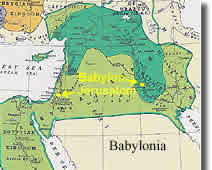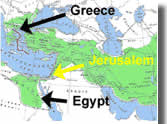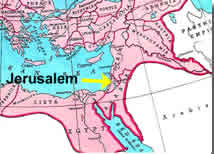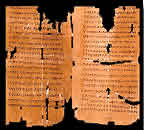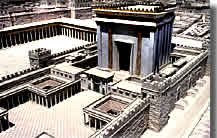| |||||||||||||||||||||||||||||||||
| Getting Started | Facts > Triumph > Hellenism |
| Hellenism | Syncretic Judaism | Jesus legend | Jesus Scholarship | |
|
|
Apostolic Legend | Apostolic Scholarship | Over Paganism | Over other Christianities |
| The
Hellenization of Mediterranean civilization |
|
|
|
It's called Hellenization. Starting in the 300s BC a powerful tide of Greek culture swept through the eastern Mediterranean. Old governments fell. Old cultures adopted Greek ideas. Hellenization changed the world. Hellenization was a very big deal. Greek culture hit Judea and Judaism in 187
BC, two centuries before Jesus. Judea
Hellenized. Judaism Hellenized. To
get this you need to know a smidge about ancient
political history. This will only hurt a little
bit, I promise. |
|
|
||||||||||
By the 500s BC, the empire governed at Babylon controlled the whole area. >>
|
||||||||||
Hellenism In 332 BC Alexander the Great, from Greece, conquered Jerusalem. >>
|
||||||||||
|
This was a Very Big Deal, because his empire lasted about 250 years*, and while the empire lasted Greek culture—associate professors call it Hellenism—spread through this whole part of the world. Hellenism included Greek language, government, architecture, philosophy—and Greek Pagan religion. |
By the way |
|
Alexander's empire didn't last very long, because Alexander didn't last too long. Right quick he up and died, and his generals split the empire into parts. But the parts lasted for about 250 years, and the culture itself lasted till the end of antiquity |
The Roman general Pompey conquered Jerusalem in 63
BC, and the region became a Roman province. |
||||||||||
Did
Hellenism affect the Jews? |
|
Diaspora. Jews settled in cities around the Mediterranean. Scholars call this the ancient Jewish diaspora. There were large Jewish communities in Pagan Egypt, Pagan Syria, and Pagan Rome, and really throughout the eastern Empire. In fact, probably twice as many Jews lived outside Jerusalem in Pagan cities as lived in Judea itself. The Jews in Alexandria, Egypt even set up a second Temple. |
By the way |
It wasn't just the Jews who diasporized, by the way. The Roman Empire was effectively one country—travel was easy, trade widespread. Thracians, Phrygians, Egyptians—pretty much everyone—also moved and settled through the empire. You don't hear much about the other folks though. |
And the Jews in these Pagan cities weren't on vacation; they moved to stay—they adapted to the local cultures. They got jobs, they made friends, they learned the local customs. Jewish kids learned Greek instead of Hebrew—which is why Jews in Alexandria, Egypt translated their sacred scriptures (key parts of the Christian Old Testament) from Hebrew into Greek, starting in the 200s BC. They had to: Jews in the diaspora grew up speaking Greek. The Greek translation is called the Septuagint. |
|||||||||||
In Jerusalem, Greek language, commerce, and literature held sway among the quisling Jewish aristocracy. Centuries BC the Babylonians kidnapped the aristocracy of conquered Judea back to Babylon. Seleucids and Romans treated their conquered subjects differently. They left Jerusalem to be governed by Jews. Of course they insisted on Jews who followed their rules—basically keeping the peace and collecting taxes. They also founded Pagan cities in Judea, with Pagan intuitions. For example, in and around Galilee the conquerors set up Hellenized Pagan cities—which is why the area around Galilee was called the Decapolis, meaning "ten [pagan] cities." Herod the Great rebuilt the Jewish Temple; he also built Pagan temples. Did any Jews cooperate? Of course. You cooperated or you got kicked out and they found someone who would cooperate. In 174 BC a fellow named Jason became the Jewish high priest at Jerusalem. Jason changed the Jewish government there from a temple-state to a Greek polis, with a governing council, citizen list, gymnasium and even a ephebeia (basically a college) He even changed Jerusalem's name to Antioch. Under Jason the Jewish high priest was an official of the Seleucid (the conquering empire's) government. Jewish priests hurried their rituals so they could get free to exercise Greek-style naked in the gymnasium. Some young Jews underwent an operation to reverse their circumcision. [1 Maccabees 1:13-15; 2 Maccabees 4:10-17]
Even Jason wasn't Hellenized enough for
some Jews, and in 167 BC the Jewish Paganizers, headed by a chap
who went by the Hellenized name Meneleus, changed the
temple ritual to worship the Semitic
"Lord of Heaven," who was equated with the supreme
God Zeus. So, yeah, in the diaspora and in Jerusalem and Judea, the Jews knew a thing or two about Pagan culture. |
|
Herod the Great—you've heard of him?—was a big time Hellenizer. Here's how one author puts it: |
"The reign of Herod
the Great transformed
Judea... Wealth flooded the land...
The landscape of the country changed as Herod
built magnificent cities
on the Greek model, added [pagan]
temples, baths,
fountains, and marketplaces..."
|
|
The next time you're in Church When they get to the part about dying-resurrected Godman, salvation and all the other stuff you know was widespread in ancient Pagan culture, remember the Hellenization of Jewish culture in the three centuries before Christ. You'll know you're hearing about stuff that predated Christianity by hundreds of years—in a culture where over and over people built new religions out of old parts. Wow! |
Foreign occupation and the Messiah myth |
As early as the second century BC the "Teacher of Righteousness" taught his followers at Qumran that they were living in the last days, and that they should look forward to the coming of the Messiah in fulfillment of prophecy. They saw themselves as the redeemed, the elect who alone would be saved. They entered the group by baptism, and celebrated a blessing with bread and wine. |
By the way |
I know that the last days and the coming Messiah in fulfillment of prophecy all sound familiar, but remember, these folks were not Christians. Were talking about 150 years or more before Jesus. |
And the Qumran folks were not unique. A group called the Zealots preached a revolutionary ideology. Messiah-ism was widely believed. Before Christ, a number of revolutionary Jewish groups had messiah-leaders, including Theudas, Judas the Galilean, and the Egyptian. These guys were each executed by the Romans. [Josephus, Jewish Antiquities 20.5.1, 18.1.1, 20.8.6] |
The important point for us is that there was a lot of messiah-ness going around exactly during the years when Jesus got to be messaih too. Jesus was not new and Jesus was not unique. |
Josephus mentions each of these messiahs. And he's confirmed by The New Testament Book of Acts, which discusses [Ch 5] the similarity between Jesus' story and those of Theudas, and Judas the Galilean; they are so similar that they can't be told apart—only the future [from a 33 AD point of view] will tell if Jesus' story is different from the others! And messiah-ism didn't end with Jesus. As late as 132 AD a revolutionary fellow named Simon bar-Kokhba was recognized as the messiah. Here's a list of Jewish messiahs from around the time of Christ. > |
Jesus
ben-Ananias |
|
The next time you're in Church When they get to the part about about God's Messiah, who comes to save his followers, remember the Qumran community, Theudas, Judas the Galilean and Simon Bar Kochba. You'll know you're hearing about stuff that predated Christianity by hundreds of years—in a culture where over and over people built new religions out of old parts. Wow! |
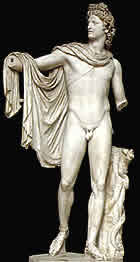
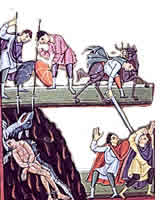 .
.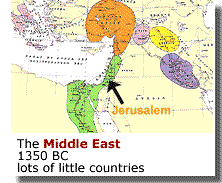 Western
civilization started in Mesopotamia a
Western
civilization started in Mesopotamia a 